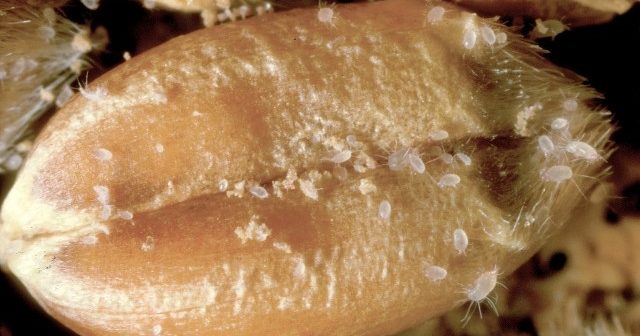Poor store hygiene can lead to mite and pest attacks of stored grain, which spoil quality and can lead to 5% and 10% loss, which can have a devastating effect on overall farm profits, or worst case scenario, can even lead to complete crop rejection. “With control measures starting up to one month before harvest, now is the time to plan what action to take and put Reldan 22 on your list of required products. It is the only grain store product that controls mites. Preventative action is needed before the combines start to roll,” says Peter Waite of Dow AgroSciences.
“Mite and pest infestations result in significant direct losses due to their feeding. Grain quality is adversely affected, with problems of reduced nutritional value, taint and contamination by insect fragments. Mites give rise to mould infestations as moisture and heat in the grain heap increases. Mites and other storage pests also act as sources of allergens, fungal infections or bacterial infections leading to difficulties when feeding animals,” he says.
Peter reminds growers that various species of mites and insects are frequent problems in grain stores and in grain heaps. “Saw-toothed grain beetle and flour mites are the most commonly occurring pest species in grain, yet some store insecticides have no effect on mites at all. Working by contact, ingestion and fumigant activity, the acaricide and insecticide Reldan 22 (based on chlorpyrifos-methyl) controls all major pests of stored grain. It is the only pre-harvest grain store fabric treatment that controls all three main mite species –the flour mite, Cosmopolitan food mite and Copra mite.
Mites are very small and difficult to see. In fact they are not easily distinguished with the naked eye from dust. One of these pests’ characteristics is their amazing ability to reproduce. The ADHB say that the flour mite (Acarus siro) which feeds inside of the grain, can multiply 7 fold in one week and the Cosmopolitan food mite (Lepidoglyphus destructor), which lives on the grain surface and in debris, can multiply 4 fold in one week. It has been calculated that you can get several million mites in 1kg of stored grain.
“Reldan 22 is a broad-spectrum acaricide and insecticide which controls a long list of other insects in addition to mites – Saw-toothed beetle, Rust-red grain beetle, Foreign grain beetle, Rust-red flour beetle, Confused flour beetle, Merchant grain beetle, Indian meal moth, Warehouse moth, Mediterranean flour moth, Grain weevil and Rice weevil.”
Peter points out that chlorpyrifos – methyl, as in Reldan, has full CRD registration and is clearly distinct from the ethyl product, which is no longer available. “Reldan 22 should be used as part of an integrated management approach to treat the fabric of the cereal or rape store. This process starts by completely emptying stores of old grain or debris. Any handling equipment such as airways, ducts, intake pits and elevators should be swept or cleaned using a high pressure airline, paying close attention to crevices where pests and dust is harboured. The sweepings need to be disposed of well away from the grain store site or be burnt. In particular make sure any grain is removed. Sticky and pit-fall traps can be set to gauge pest levels. Good ventilation, drying and cooling are important, too.”
“Reldan 22 is applied at 200 mls in 5 to 10 litres of water per 100 square metres of surface when treating the fabric of the store. The higher water volume should be used on porous surfaces. For stores intended for oilseed rape, if the store is metal, allow 4 weeks minimum before loading with rape seed. If the store is concrete, this can be reduced to 1 day but ideally 4 weeks is needed to allow pests to emerge from cracks and crevices and come into contact with the insecticide. One treatment only is allowed. There is no withholding period and up to 6 months protection of the store can be expected, giving long term peace of mind.”
“Reldan 22 can also be used directly on harvested cereals coming into store as a grain treatment. In this instance Reldan 22 is applied at 20 ml/tonne to the grain that has been dried, cooled and cleaned. Last year a new low dose recommendation was introduced for a 10 ml/tonne, which has no withholding period. When applying the full dose rate of 20 ml/tonne of grain, this grain cannot be processed for 90 days, so is more suited for long term storage. This means that you can use Reldan 22 if intending to sell grain out of the store quickly or for grain intended for longer storage, allowing flexibility to respond to market fluctuations. Wheat, barley, oats and rye can be treated in this way, but not oilseed rape or crops destined for seed.”
Peter Waite explains that “Reldan 22 is accepted by the British Beer and Pub Association (BBPA) and the Brewing Research International (BRI) for use on cereals for malting and brewing. For oilseed rape, call the Technical Helpline 0800 689 8899 for up to date advice.”




